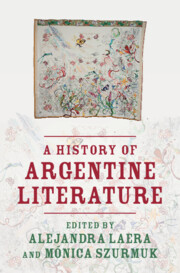Book contents
- A History of Argentine Literature
- A History of Argentine Literature
- Copyright page
- Contents
- Figures
- Contributors
- Editors’ Acknowledgments
- Introduction
- Part I Literary Dates
- Chapter 1 1536: The Creation of a Literary Space
- Chapter 2 1810: Patriotic Voices
- Chapter 3 1837: The Foundation of a National Literature
- Chapter 4 1884: A Literary Field in Formation
- Chapter 5 1910: A Modern Lettered City
- Chapter 6 1926: Traditions Old and New
- Chapter 7 1948: Culture and the State
- Chapter 8 1963: Experimentation and the Common Reader
- Chapter 9 1980: Memory and the Novel
- Chapter 10 2001: Argentine Narrative in the New Millennium
- Part II Critical Inroads
- Part III Literary Names
- Index
- References
Chapter 7 - 1948: Culture and the State
from Part I - Literary Dates
Published online by Cambridge University Press: 09 May 2024
- A History of Argentine Literature
- A History of Argentine Literature
- Copyright page
- Contents
- Figures
- Contributors
- Editors’ Acknowledgments
- Introduction
- Part I Literary Dates
- Chapter 1 1536: The Creation of a Literary Space
- Chapter 2 1810: Patriotic Voices
- Chapter 3 1837: The Foundation of a National Literature
- Chapter 4 1884: A Literary Field in Formation
- Chapter 5 1910: A Modern Lettered City
- Chapter 6 1926: Traditions Old and New
- Chapter 7 1948: Culture and the State
- Chapter 8 1963: Experimentation and the Common Reader
- Chapter 9 1980: Memory and the Novel
- Chapter 10 2001: Argentine Narrative in the New Millennium
- Part II Critical Inroads
- Part III Literary Names
- Index
- References
Summary
By 1948, President Perón’s first economic program was yielding results and enjoying broad political and social support while strengthening an expanding state infrastructure. The consolidation of this nationalist and anti-liberal model had an impact on cultural production, particularly on an expanded literary field. Between 1948 and 1949 several works that became canonical were published, offering a diversity of perspectives on the debates that crisscrossed Argentine culture: the novels Adán Buenos Ayres (Leopoldo Marechal), El túnel (Ernesto Sábato), the essay Muerte y transfiguración de Martín Fierro (Ezequiel Martínez Estrada) and in the short-story collection El Aleph (Jorge Luis Borges). Differences arose not only out of divergent political positions but also, and perhaps more poignantly, out of the disparate conceptual frameworks around which intellectual debates took place: ideas of order and chaos, organization and entropy, community and disorder. Terms like “pueblo” and “popular” became essential and unavoidable to discuss fiction, literary language, the role of literature, and literary institutions that grouped writers.
- Type
- Chapter
- Information
- A History of Argentine Literature , pp. 97 - 111Publisher: Cambridge University PressPrint publication year: 2024



